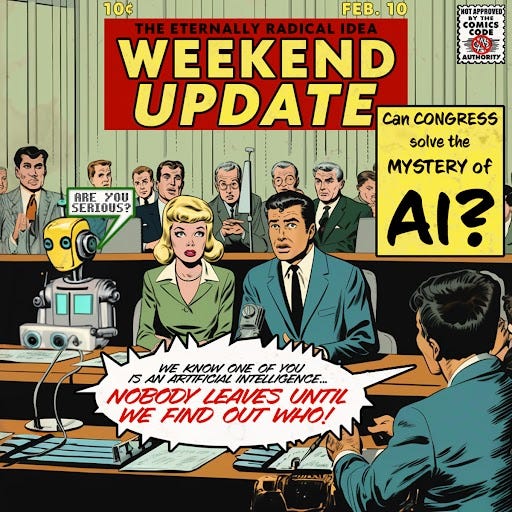Mr. Lukianoff goes to Washington & introducing FIRE’s Campus Deplatforming Database
Bringing you the latest free speech news (2/11/2024)
Story of the week
On Tuesday, I testified before the House of Representatives’ Judiciary Committee’s special subcommittee on “The Weaponization of the Federal Government.” I tried to raise alarm about the dual threats that AI bias and regulatory capture of AI pose to free speech. Check out the full text of my opening remarks or the full video recording of the hearing. I was thrilled to be able to testify alongside Lee Fangwhose full opening remarks can be read here.
The rapid development of artificial intelligence tools, in particular, offers powerful entities the unprecedented ability to monitor, flag, and censor billions of individuals at a scale and scope never before conceivable. While this technology holds significant benefits, it also carries substantial risks. Private security firms are increasingly marketing AI solutions to both government agencies and corporations. Mounting evidence suggests that state and business interests are already deploying this technology with the goal of stifling lawful discourse and silencing dissent.
This week in ERI
I offer my candid thoughts on the hearing in A Tale of Two Congressional Hearings (and several AI poems)
This week in FIRE’s blog
Introducing FIRE’s Campus Deplatforming Database by Sean Stevens
D.C. high school bans student club from screening documentary critical of Israel by Carrie Robison & Aaron Terr
FIRE’s First Amendment News
Generative AI and the future of last century law — First Amendment News 411 by Ronald K. L. Collins. Ron provides a good collection of the last year or so worth of expert prediction on the intersection between law and AI, as well as this pithy introductory historical review:
Centuries ago (circa 370 BC), Plato indicated as much in his “Phaedrus,” when Socrates attacked the notion of transforming the spoken word into writing. The same principle was at work with the advent of the printing press when it trumped scribal texts and ultimately upset the rule of the Papacy. Given how the Gutenberg technology rearranged the architecture of life and law, Madison and his colleagues wisely set out to protect a technology — “or of the press.” One modern example is the arrival of the Internet and how, among other things, it functionally decriminalized obscenity (or most of it) and operationally legitimated a large swath of libel law.
And now that old story is beginning to repeat itself with the arrival of Generative Artificial Intelligence.
FIRE’s ‘So to Speak’ podcast
Enjoy this episode from a little over a year ago, “Is AI protected by the First Amendment?” featuring Eugene Volokh, David Green, and Alison Schary
‘Canceling’ Update
Movie of the week!
Filling out the theme of artificial intelligence week in a sexy, dark, psychodrama way, our movie of the week is Ex Machina




Nothing on the Mark Steyn - Michael Mann trial?